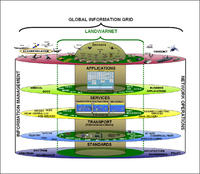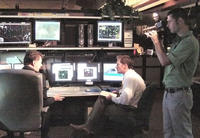-
Infrastructure security, disaster planning “Super map” developed

A U.S. Marine stationed at the Quantico base in Virginia has developed sophisticated mapping software that can give users full situational awareness of their surroundings in real-time; the software is a “super map” taking in a torrent of data streams from emergency dispatch reports to weather forecasts, traffic reports, and security system alerts
-
-
If Japan-like disaster happened in U.S., results would be far worse
An estimated 20,000 people died or are still missing after a massive earthquake-induced tsunami struck Japan on 11 March 2011, yet some 200,000 people were in the inundation zone at the time; experts say that if the same magnitude earthquake and tsunami hits the Pacific Northwest, the death toll will be much higher because of the lack of comparable preparation; that 90 percent rate could be the number of victims, not survivors
-
-
Critics: current chemical safety standards insufficient, should not be extended
Critics of the current chemical plant safety standards say these standard are insufficient and should be extended; critics cite EPA data to highlight the fact that current safety standards leave more than 110 million Americans at risk from high-risk chemical plants
-
-
Top LulzSec hackers arrested, leader turns them in
In the ongoing battle between law enforcement officials and hackers, authorities announced on Tuesday that they had arrested leading members of the hacktivist group known as LulzSec after their leader allegedly turned them in
-
-
National Weather Service budget cuts threaten poor IT infrastructure

The Obama administration has proposed cutting more than $39 million from the National Weather Service’s (NWS) budget, particularly from its IT department, and critics worry that the cuts could cause the agency’s already crippling infrastructure problems to grow worse
-
-
NSA pushes for greater federal cybersecurity role
General Keith Alexander, the head of the National Security Agency (NSA), and other intelligence officials are pushing the Obama administration to expand the role of the NSA in federal cybersecurity initiatives
-
-
Senators compete over critical infrastructure cybersecurity bill
Lawmakers are currently struggling to come to a consensus on which government agency should be in charge of securing the nation’s cyber infrastructure
-
-
AlertEnteprises wins three awards for critical infrastructure security tech
Last week AlertEnterprise announced that it had been given three awards for its identity and access management technology used to help secure critical infrastructure
-
-
Asteroid 2011 AG5 worries to be justified – or not -- in February 2023
Asteroid 2011 AG5 is one of 8,744 near-Earth objects that have been discovered; it is approximately 460 feet (140 meters) in size; it is on a collision course with Earth for 5 February 2040 – but we will k now for sure in February of 2023, when it will pass Earth no closer than about one million miles, making it possible for scientists to plot its future trajectory
-
-
Robots to climb and assemble structures, making construction safer

In the near future, armies of robots could nimbly be crawling up towers and skyscrapers to make repairs, so humans do not have to; the design of the truss pieces, which have ridges and specially designed locks so the robot can manipulate them, is as important as the robot itself, and researchers express the hopes that in the future such robot-friendly building components would be standardized for widespread use
-
-
Physicists predict when brittle materials fail
It does not happen often, but structures like bridges, airplanes, and buildings do fail, sometimes catastrophically; what are the odds, and how can it be prevented? Researchers just published new theoretical insights into the probability of structural failures, based on hundreds of thousands of computer simulations
-
-
Recycled glass in cement makes concrete stronger
Researchers have found that by mixing ground waste glass into the cement that is used to make concrete, the concrete is stronger, more durable, and more resistant to water; in addition, the use of glass helps reduce the amount of glass that ends up in landfills
-
-
Helping software to help improve software
The earlier a problem is detected, the easier it can be solved; before implementing complex programs in a time-consuming process, computer scientists also want to know whether they will reach the desired performance
-
-
Lawmakers blast DHS for problems with chemical facility security program
At a recent Congressional hearing, lawmakers blasted DHS officials for their failure to follow through with a program designed to secure chemical facilities in the United States
-
-
Invisibility cloak to protect buildings from earthquakes
Scientists show that by cloaking components of structures with pressurized rubber, powerful waves such as those produced by an earthquake would not “see” the building — they would simply pass around the structure and thus prevent serious damage or destruction
-
- All
- Regional
- Water
- Biometrics
- Borders/Immig
- Business
- Cybersecurity
- Detection
- Disasters
- Government
- Infrastructure
- International
- Public health
- Public Safety
- Communication interoperabillity
- Emergency services
- Emergency medical services
- Fire
- First response
- IEDs
- Law Enforcement
- Law Enforcement Technology
- Military technology
- Nonlethal weapons
- Nuclear weapons
- Personal protection equipment
- Police
- Notification /alert systems
- Situational awareness
- Weapons systems
- Sci-Tech
- Sector Reports
- Surveillance
- Transportation
Advertising & Marketing: advertise@newswirepubs.com
Editorial: editor@newswirepubs.com
General: info@newswirepubs.com
2010-2011 © News Wire Publications, LLC News Wire Publications, LLC
220 Old Country Road | Suite 200 | Mineola | New York | 11501
Permissions and Policies
Editorial: editor@newswirepubs.com
General: info@newswirepubs.com
2010-2011 © News Wire Publications, LLC News Wire Publications, LLC
220 Old Country Road | Suite 200 | Mineola | New York | 11501
Permissions and Policies
